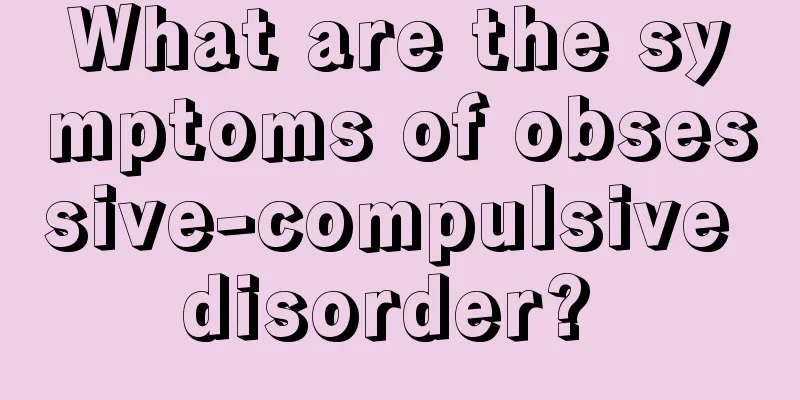What are the symptoms of obsessive-compulsive disorder?

|
Many people often hear the term obsessive-compulsive disorder in life, but what exactly is obsessive-compulsive disorder? This makes people feel confused. Obsessive-compulsive disorder has various manifestations in life and will have a certain impact on life and physical health. So when everyone thinks that this kind of thing is not a serious illness, they are very wrong. So what are the symptoms of obsessive-compulsive disorder? 1. Obsessive thoughts refer to the patient's loss of control over a certain subconscious desire, impulse, or an idea that he knows should not and is unnecessary to appear. Although he tries to get rid of it, he is unable to stop and eliminate this involuntary repetitive thinking. Common obsessions include: 2. Compulsive recollection and association: This means unconsciously repeating and remembering certain things that you have experienced or done, as well as what you or others have said. Common symptoms include a past event, a sentence or a song repeatedly appearing in the mind. Bin's symptom is compulsive recollection. 3. Compulsive doubt: doubting what you have just done, such as doubting that the door is not locked after you have just locked it; doubting that you did not put a stamp on the letter after you put it into the mailbox; doubting that you missed or made mistakes in the homework after you have just finished it; and doubting that your hands are dirty after you have just washed them. Obsessive-compulsive patients often show doubt and anxiety, and perform compulsive behaviors, such as repeated checking and repeated washing of hands. 4. Compulsive opposing ideas: Simply put, the more you want to control the thoughts, the more they will keep appearing. Such thoughts or ideas are often bad and violate moral concepts. They are a reflection of the patient's potential desires. Therefore, the patient feels deeply ashamed and nervous, afraid of being seen by others, and tries hard to control them. However, the more he tries to control them, the greater the temptation becomes, and the more frequently they occur, which constantly increases the patient's sense of guilt and inferiority. 5. Compulsive thinking: This symptom is similar to being obsessed with trivial matters. The patient will dwell on some meaningless issues and become entangled in them and unable to extricate himself. A female student said during a psychological consultation: "Because I am not good at studying, I am under a lot of pressure, so I always force myself to figure out all the knowledge points, and I will try my best to think even if I can't figure it out. But recently, I sometimes think of some strange questions, such as why 1+1=2 is not equal to 3? The more I think about it, the more confused I am, so I enter a vicious circle. I was very nervous and began to resist this idea firmly, but I got deeper and deeper into it, and I couldn't even study normally." This is a typical symptom of obsessive thinking. The patient's thinking is like being forced onto a never-ending train with no end, and eventually he is exhausted both physically and mentally. |
<<: Does irregular heartbeat require treatment?
>>: Why does my stool always come in small pieces?
Recommend
Complications of radiotherapy for pancreatic cancer
What are the complications of radiotherapy for pa...
What are the symptoms of pulpitis?
Pulpitis is a relatively common oral problem, and...
Can pure silver be soaked in water and drunk?
Pure silver can be used to soak in water for drin...
How long can you live with stage 3 lymphoma
Lymphoma mainly manifests itself in the lymphatic...
How to arrange the diet for liver cancer patients? Two principles for liver cancer patients' diet
Whether before or after treatment, the diet of li...
What material is better for underwear?
Whether you are a man or a woman, choosing the ri...
Is ALT 96 serious?
Alanine aminotransferase exists in the liver, hea...
What is the cause of fecal incontinence in late stage lung cancer
The probability of brain metastasis in advanced l...
Is polycystic kidney disease serious? It turns out to be like this
Polycystic kidney disease is a common hereditary ...
How long can a person with prostate cancer live
The survival of prostate cancer patients varies d...
Can I eat shrimp if I have breast cancer?
Patients can eat shrimp, because shrimp meat cont...
Explain the common knowledge about fibroids
With the improvement of living standards, fibroid...
Prostate cancer recurrence indicators
Prostate cancer recurrence indicators? For variou...
Symptoms of cold and dampness in the stomach
In today's society, the development of scienc...
Does soaking dried bitter herbs in water have the effect of reducing internal heat?
I believe many people have eaten bitter herbs in ...









